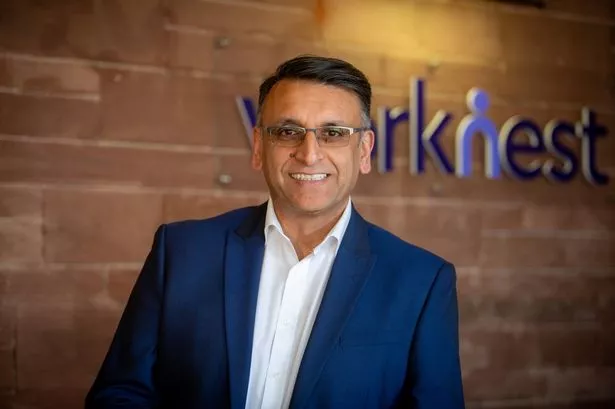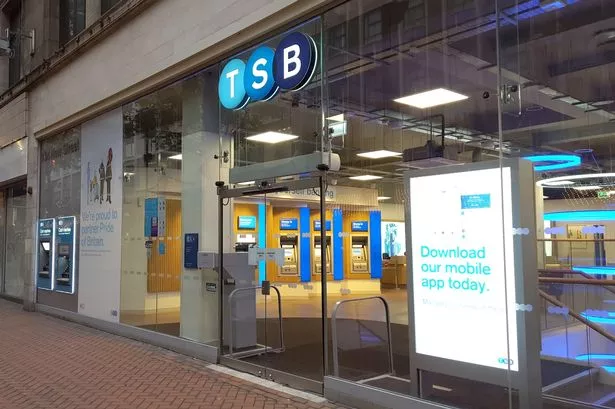
Newcastle's Sapphire HR rolls out services after five-figure investment
A Tyneside HR company is putting expansion plans into action on the back of a five-figure investment. Newcastle-based Sapphire HR was launched six years ago to provide HR solutions to small business owners, and the last year has seen bosses gear up for rapid growth. The team moved to its new, bigger premises at Clavering House in Newcastle city centre in June, where it has been developing its services and investing in new IT infrastructure. Now, with the help of a five-figure loan from NPIF II – NEL Smaller Loans Fund, which is managed by NEL Fund Managers as part of the Northern Powerhouse Investment Fund II (NPIF II), the company is set to recruit two new HR advisers, develop its marketing strategy, grow its client base, and more than double turnover in the next year. Sapphire has also launched a new service called HR in a Box, designed for businesses with fewer than five employees, providing them access to affordable support – a product which comes at a crucial time as small business owners navigate new challenges, including changes to the national minimum wage, national insurance contributions, and the upcoming employment rights bill. Founder and managing director Michael Dobson said: “I started Sapphire HR with a vision to support businesses who may not have the budget to hire a larger consultancy firm, or the time or skills to manage their own HR function. We pride ourselves on offering the same products and services as our larger competitors but with a much more personalised offering. Six years on, I’m delighted with how the business has developed. “We have a number of loyal customers who we’ve worked with since 2018 and now, with substantial planning and the investment from NEL, we’re looking to increase our client base dramatically. There are some major employment related changes happening and we needed to scale to support many more businesses which will need professional HR support to navigate their way through them.” Susan Snowdon, investment executive at NEL, added: “The Sapphire team presented a thorough review of the business’s growth potential and the robust plans they have in place to take advantage of the opportunities in front of them. It was a pleasure to work with Michael and I look forward to seeing his and his team’s hard work pay off with the backing of NEL’s investment.” Sapphire HR was introduced to NEL Fund Managers by Michael Cantwell, corporate finance partner at Clive Owen LLP.

Lloyds boss warns motor finance scandal threatens UK economy after FCA ruling
Lloyds Banking Group's chief executive, Charlie Nunn, has warned that the controversy surrounding now-prohibited motor finance deals could pose a threat to the UK economy. Speaking at the Financial Times’ Global Banking Summit, Nunn stated that the shock court ruling in October over 'secret' car loan commissions "creates an investability problem" for Britain’s wider consumer finance sector, as reported by City AM. The motor finance industry was shaken when senior judges ruled that a lender could not pay commission to a motor finance broker without obtaining the customer’s fully informed consent. This ruling has increased the likelihood of the Financial Conduct Authority (FCA) implementing a multibillion-pound redress scheme as part of its review of the so-called discretionary commission arrangements, which were banned in 2021. "The level of uncertainty means we just don’t know what it’s going to mean yet," said Nunn. "We have a legal decision, a Court of Appeal decision, that is at odds with the last 30 years of regulation. And the uncertainty that creates in our environment is unique, it’s very different from other economies in the world." Since the ruling, Lloyds’ share price has dropped 14 per cent. It is considered the most exposed bank to the FCA’s review, owning the UK’s biggest auto lender Black Horse. In February, Lloyds set aside £450m to cover potential costs from the probe, although analysts at RBC have estimated that it could take a total profit hit of up to £3.9bn. Nunn contended that motor finance is "a really important part of the British economy", with 85 per cent of people borrowing to buy a new car and roughly 60 per cent for second-hand cars. He further stated that the prevailing uncertainty made it challenging for Lloyds’ own investors "to have the confidence to provide us the capital" to make consumer finance a "thriving industry". "I’ve met over 100 investors in the last few weeks, and investors are telling us that they’re really concerned about the uncertainty this creates on that sector, on the financial sector, and the UK more broadly," Nunn expressed. Legal experts have suggested that October’s ruling could establish a precedent for other areas of consumer finance beyond car loans. Close Brothers and South African bank FirstRand, the lenders involved in the test case, have announced their intention to appeal the ruling to the Supreme Court. "Investors are looking at this and saying this principle of the courts coming up with decisions independently from the regulation, which is then having a significant retrospective lookback, is already bleeding across the whole economy," Nunn commented.

WorkNest expands with Wirehouse acquisition for undisclosed sum
Leading North West employment consultancy WorkNest has swooped for a Warrington business in an undisclosed deal. Chester based WorkNest, an employment law, HR, and health and safety specialist, has acquired Wirehouse Employer Services in a deal which will extend its new owner’s national client base while broadening its team of specialists and qualified consultants. Worknest is a division of The GRC Group, an Inflexion-backed leader in governance, risk and compliance software and tech-enabled services, while Wirehouse provides retained HR, employment law and health and safety consulting and advice services to SMEs. Founded in 2010 and based in Warrington, Wirehouse offers services closely matched to WorkNest’s HR and health and safety solutions, assisting businesses across a range of sectors throughout the UK, providing advice and support on sector-specific egislation. The deal marks the third acquisition for The GRC Group this year and the first acquisition in the employment law, HR and health and safety space this year. It follows the group’s acquisitions of cyber security businesses Bulletproof Cyber, in May, and Pentest People, last month. Ifti Ahmed, CEO at WorkNest, said: “We pride ourselves on working closely with employers nationwide to provide high-quality, pragmatic, and professional advice and support. This acquisition enhances WorkNest’s scale in our core SME market and plays to our strength of integrating complementary businesses in our field. “I’m very pleased to welcome our new colleagues who share the same commitment to delivering fantastic client service. Wirehouse’s long track record of profitable growth is a testament to its leadership over 14 years, which has built a strong and trusted reputation in our sector.” Sue Malley, managing director at Wirehouse, said: “We’re extremely excited to join up with the WorkNest team. Given the compatibility of the businesses, we can see the opportunity to enhance our offer and deliver significant benefits to our valued clients. With the expanded scale and range of services provided by the wider group, we look forward to an exciting period of strategic development and growth for our business.

London Stock Exchange owner sells off stake in Euroclear for £455m
The London Stock Exchange Group (LSEG) has offloaded its minority stake in financial markets infrastructure provider Euroclear, netting £455m from the sale. The divestment of LSEG's 4.92% holding in the Belgium-based firm was announced on Thursday, with the stake being sold to TCorp, the investment and financial management partner of the New South Wales government in Australia, as reported by City AM. This sale represents a significant return for LSEG, which purchased the stake for €278.5m (£241.9m) in 2019. The deal implies a valuation of approximately £9.25bn for Euroclear, a company that plays a crucial role in the global clearing and settlement of securities transactions, including bonds, equities, derivatives and investment funds. LSEG initially invested in Euroclear to bolster its influence over core market infrastructure. Under the leadership of American banker David Schwimmer, who joined as CEO in 2018, LSEG has evolved into a data and analytics powerhouse with around 25,000 employees and operations in over 60 countries. However, concerns have been raised about its flagship exchange, which has seen only 14 new firms list this year, marking one of its worst periods for IPO activity. Intercontinental Exchange, the owner of the New York Stock Exchange, also recently sold its stake in Euroclear for €709m, leading to companies owned by the French and Belgian governments becoming investors in the firm.

TSB Bank names new boss as Robin Bulloch to retire after 45-year career
TSB Bank has announced the appointment of Marc Armengol as its new CEO, succeeding current boss Robin Bulloch who is set to retire after a 45-year banking career. The bank revealed on Friday that Armengol, currently serving as the director of operations and technology at Spanish parent company Banco de Sabadell, is expected to take up his new role at TSB in early 2025, as reported by City AM. Armengol, who has been a member of TSB's board since 2022, previously held the position of strategy director and was part of TSB’s executive committee from 2018 to 2021. He joined Sabadell in 2002 and has occupied several roles, including a three-year term as chief operating officer of its international businesses. TSB's chair, Nick Prettejohn, praised Armengol as "is a proven leader and knows TSB well". Bulloch, who became TSB’s permanent CEO in April 2022 following a four-month interim period after Debbie Crosbie left for Nationwide Building Society, said: "I have been very fortunate to work in retail banking for virtually my whole career with a focus on doing what’s right for our customers," He added that ending his executive career at TSB, where he opened his first bank account at age five, gives him "The fact that my executive career concludes with me at the helm of TSB, where I opened my first bank account aged five, gives me a personal sense of fulfilment." This leadership transition, which is subject to regulatory approval, comes at a crucial time for TSB as Sabadell battles a hostile takeover bid from larger domestic competitor BBVA. If BBVA's takeover bid is successful, it is anticipated that the Spanish banking giant may look to sell TSB due to its relatively small footprint in the UK market, a contrast to Sabadell's more extensive operations. Marc Armengol commented on the situation as various international authorities have already approved BBVA’s proposal, yet the Spanish government has expressed opposition. Moreover, an antitrust investigation by Spain's competition authority could delay proceedings until 2025. TSB is concurrently undergoing a restructuring effort aimed at bolstering its profitability. In May, the bank announced plans to eliminate approximately 250 jobs and close 36 branches as part of a cost-cutting strategy that includes a pivot towards digital services. Armengol shared his enthusiasm about "building on the great work and passion and commitment of TSB colleagues". The history of TSB dates back to 1810 when it was established as the Trustee Savings Bank. It merged with Lloyds Banking Group in 1995 but was later sold off following the financial crisis. Sabadell acquired TSB for £1.7 billion in 2015. However, TSB faced significant challenges under new ownership, particularly in 2018 when an IT disaster occurred during an attempt to transfer customer data to Sabadell's new computer system.

Saving the day: How helping employees save could have ‘immediate and direct impact’ on thousands of families
Helping your employees to start saving money could transform their lives – so Co-op boss Shirine Khoury-Haq and Manchester metro mayor Andy Burnham joined up to encourage bosses to think of new ways to support their colleagues. Many people in the UK workforce are struggling to put money aside for rainy days, as the cost of living crisis has continued to hit hard. That leaves them vulnerable to financial shocks and means their mental health can suffer as they worry about their debts and their finances. Now employers are being urged to support their workers by launching opt-out saving schemes to help people get their savings pots started. While auto-enrolment for pensions has become the norm, most workplace savings schemes are opt-in. But the Co-op and other employers including Bupa have been trialling auto-enrol schemes where their staff are signed up to savings schemes automatically until they choose to opt out, meaning small amounts are taken out of every pay packet and put into instant access savings accounts. They say the schemes have been a hit with staff. And the Co-op’s CEO Ms Khoury-Haq said that if more companies introduced such measures, it could have an “immediate and direct impact on the financial resilience of thousands of individuals employed in Greater Manchester and the North West ”. She spoke at a Talk Money Week event at the Co-Op’s Manchester headquarters, organised with financial innovation centre Nest Insight which is working to promote financial security in the UK. Ms Khoury-Haq said: “The experience of our Co-op in offering a workplace savings scheme has been hugely positive for us as an employer and also for our co-op colleagues.” The Co-op CEO said the Co-op regularly surveyed its 55,000 colleagues, and had found that one-off expenses can pose “significant financial difficulty” for those without savings and who have “little or no give.” Those team members, she said, “have told us that starting to save is a huge challenge for them”. So instead the Co-op has worked with Nest Insight to launch an opt-out savings scheme. Of those auto-enrolled, 7/10 have continued saving. Ms Khoury-Haq said: “The default solution for colleagues is to start saving small amounts unless they actively say they don’t want to.” And she added: "We think this approach could be as transformative as the intro of auto enrolment for pensions.” And she added: “Now that we know the approach works we’re really keen to encourage other employers to do the same”. Encouraging savings could, she said, support anti-poverty strategies across the region. And she said that helping people start saving is a “simple yet effective measure that employers have the power to make happen”. Ms Khoury-Haq said the Government should promote auto-enrolment in savings schemes. Mayor Burnham smiled that in Talk Money Week, he had “had the ultimate talk money conversation” just the same morning, as Chancellor Rachel Reeves had been in town. He smiled: “We need more (money) in Greater Manchester. It pretty much went like that.” The mayor pointed to the most recent GM Residents' Survey, in which 51% of people said they would be unable to afford an immediate but essential expense of £850. He said that lack of savings hit people’s mental health, and their ability to work and even sleep. And he said the rise in the number of families in temporary accommodation over the past decade was a sign of the financial struggles so many people were facing. The mayor added that often “you take it for granted that you live your life with savings behind you. But what happens if you don’t?” He welcomed the Co-op’s pilot auto-save scheme, and said he wanted to help people in the region to move beyond the debt “dragging them down”. The first panel discussion saw representatives from businesses who have implemented auto-saving share their insights with sector leaders. Alex Henley, wellbeing consultant at Co-op, said the number of colleagues with savings had grown since the scheme was introduced, and said colleagues wanted their employer to help them get started He said: “The really important thing is just how empowering this is for colleagues… it does give them security and dignity. It restores people’s sense of self-worth and gives them confidence.” Katie Duxbury, head of pay and reward services at Bupa, said her business had implemented an auto-save scheme after seeing low-take up on two earlier voluntary savings schemes. She said it had felt like the right thing to implement after colleagues reported being put under pressure by the cost of living crisis – and said staff had welcomed the scheme. Katie smiled: “Nobody ever rings payroll on payday to say thank you”. But after their savings scheme was introduced, the team did get a call from a colleague saying thanks because they now had savings for the first time. And she said the scheme meant some colleagues were now able to do more shifts, because they had the financial cushion to be able to pay for their travel to work. Asked about implementing the scheme, she said: “It’s really easy to switch this on.” Roger Shelton, CCO at Sheffield credit union Transave UK, is working with 60 employers on savings schemes and is helping people who have never saved properly before – including one person who just had some cash in a box under the bed. He said auto-savings schemes could encourage people who were putting off saving to make a real start. He said: “It’s like the gym – we mean to do it but don’t necessarily do it.” Jo Phillips, director of research and innovation at Nest Insight, talked about the impacts of people’s financial struggles on their work and on their mental health. She said saving is too often seen as being about financial education, but that it’s not a knowledge gap that’s the issue - people know they need to save, but can’t. Auto-enrolment in savings schemes, she said, is one solution. She added: “It’s not about removing choice…all we’re doing is making it easier for people to start saving. We’ve flipped the default.” Jo said that at the Co-op, the auto-enrolment scheme had seen the number of colleagues saving regularly rise from 10% to well over half. And she said feedback had been positive: “We see people talking about control and empowerment”. The second panel discussed how encouraging saving could help the people of Greater Manchester. Ian MacArthur, director of the GM Good Employment Charter, said that in the 2010s when employers talked about health and wellbeing they “probably meant a fruit bowl and a yoga class”. But since the pandemic employers had become more aware of the need to support their teams’ mental and financial health. Looking at auto-enrolment in saving, he said employers could look to work with local credit unions rather than global banks. And he concluded: “My selling point is this – it’s going to cost you nothing and you’re going to give your employees something, something potentially valuable. This is an absolute gift. Use it.” Rose Marley, CEO of Co-operatives UK, said co-ops were one of the North’s biggest global success stories – but sometimes little known in the UK. She talked about supporting employees with saving and said “This is an innovation opportunity for all forms of business”.